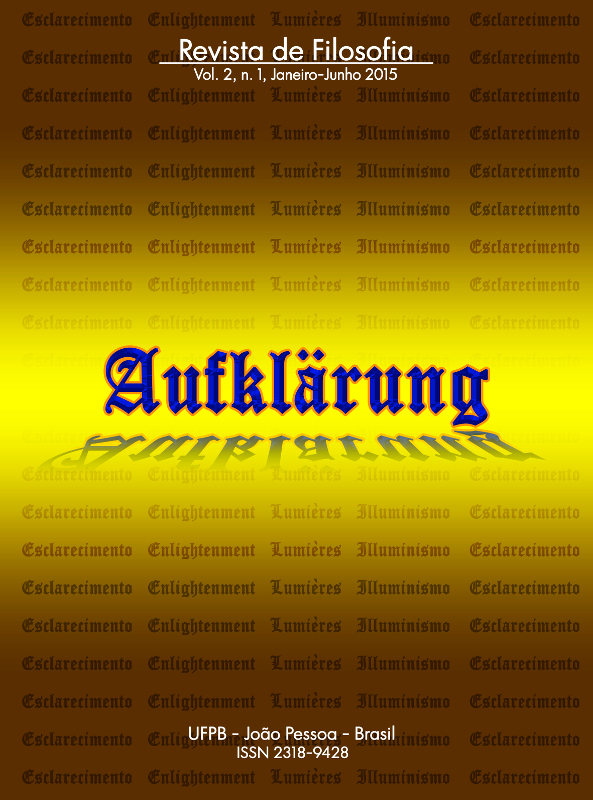Natural Law And Civil Law in John Locke
DOI:
https://doi.org/10.18012/arf.2016.21184Keywords:
John Locke, natural law, civil law, liberty, republicanismAbstract
This paper deals with the relationship between natural law and civil law in John Locke’s philosophy. Although renowned scholars have claimed that such a relationship is deductive, this paper will try to show a different interpretation and argue that the relationship between civil law and natural law is one of determination. Far from being a mere deduction of an immutable natural law, civil law plays a determinative role in natural law. As we shall see, this interpretation highlights something that Locke held in high regard: the deliberative character of natural law. Citizens’ deliberation in the legislature to some extent creates natural law. Citizens are thus free to determine the law, and participating in such a determination is crucial to their political liberty. In this sense, as we shall explain, Locke’s political liberty is akin to republicanism.Downloads
References
BARROS, Alberto. “A matriz inglesa”. In: BIGNOTTO, N. Matrizes do republicanismo. Belo Horizonte: Editora UFMG, 2013.
BENTHAM, Jeremy. “Anarchical fallacies”. In: The Works of Jeremy Bentham: Published under the Superintendence of His Executor, John Bowring. Volume 2. Edimburgo: William Tait, 1843.
BOBBIO, Norberto. Locke e o direito natural. Trad. de S. Bath, 2ª ed. Brasília: Editora Universidade de Brasília, 1998.
BUCKLE, Stephen. Natural law and the theory of property. Oxford: Oxford University Press, 1991.
CÍCERO, Marco Túlio. De legibus e De re publica. Trad. de C. Keyes. Col. Loeb Classical Library. Massachusetts: Harvard University Press, 2006.
HARRINGTON, James. The commonwealth of Oceana and A system of politics. (1656) Editado por J. G. A. Pocock. Cambridge: Cambridge University Press, 1992.
LASLETT, Peter. “Introduction”. In: LOCKE, J. Two treatises of government. Cambridge: Cambridge University Press, 1988.
LIMONGI, Maria Isabel. “Direito, história e política em Locke”. In: ROCHA, E. LEVY, L. Estudos de filosofia moderna. Porto Alegre: Linus, 2011.
LOCKE, John. An essay concerning human understanding (1689). Col. Great Books of the Western World, vol. 35. Chicago e Londres: Encyclopædia Britannica, 1952.
_____. Essays on the law of nature and associated writings. Ed. de W. Von Leyden. Oxford: Clarendon Press, 2002.
_____. Locke: political essays. Org. de M. Goldie. Cambridge: Cambridge University Press, 1997.
_____. “Second treatise”. In: Two treatises of government (1690). Ed. de P. Laslett. Cambridge: Cambridge University Press, 1988.
_____.“Segundo tratado”. In: Dois tratados sobre o governo. Trad. de J. Fischer. São Paulo: Martins Fontes, 2005.
OXFORD ENGLISH DICTIONARY. Advanced Learner’s, 7th edition, 2005.
PETTIT, Philip. Republicanism. Col. Oxford Political Theory. Nova Iorque: Oxford University Press, 2010.
PITKIN, Hanna. “Obligation and Consent”. In: LASLETT, P. RUNCIMAN, W. SKINNER, Q. Philosophy, politics and society, 4th series. Oxford: Blackwell, 1972.
RAWLS, John. “Lectures on Locke”. In: Lectures on the history of political philosophy. Cambridge, MA e Londres: Harvard University Press, 2007.
RUSSELL, Bertrand. “Locke’s political philosophy”. In: A History of Western Philosophy. Nova Iorque: Simon & Schuster, 1972.
SALÚSTIO. Bellum Catilinae. Trad. de J. Rolfe. Col. Loeb Classical Library. Massachusetts: Harvard University Press, 1931.
SELIGER, Martin. “Locke’s natural law and the foundation of politics”. Journal of the history of ideas. Vol 24, no. 3, julho – setembro 1963.
SHAKESPEARE, William. “Richard III”. In: The plays and sonnets of William Shakespeare. Col. Great Books of the Western World, vol. 26. Chicago e Londres: Encyclopædia Britannica, 1952.
SKINNER, Quentin. “A third concept of liberty”. In: Proceedings of the British Academy 117. Londres: British Academy, 2002.
STRAUSS, Leo. Natural right and history. Chicago e Londres: The University of Chicago Press, 1953.
VILLEY, Michel. Le droit et les droits de l’homme. Paris: PUF, 2008.
WALDRON, Jeremy. “Locke’s legislature (and Rawls’s)”. In: The dignity of legislation. Cambridge; Cambridge University Press, 1999.
WOOD, Neal. Cicero’s social and political thought. Califórnia: University of California Press, 1988.
Additional Files
Published
How to Cite
Issue
Section
License
Journal general policy
1.This journal works under a Creative Commons License aplied to online journals. That icence can be read in the following link: Creative Commons Attribution 4.0 International (CC BY 4.0).
2.Accordingly to this License, a)the journal declares that authors hold the copyright of their articles without restrictions, and they can archieve them as post-print elsewhere. b)the journal allow the author(s) to retain publishing rights without restrictions.
Metadata Policy for information describing items in the repository
1. Anyone may access the metadata free of charge at anytime.
2.The metadata may be re-used in any medium without prior permission, even commercial purposes provided the OAI Identifier or a link to the original metadata record are given, under the terms of a CC BY license refered for the Journal.







































